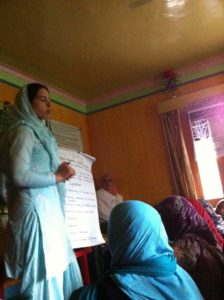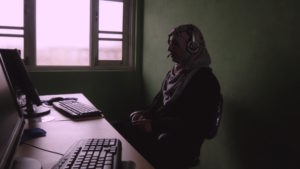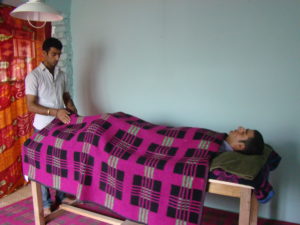Healing Minds Foundation
What we do
Kashmir’s population has constantly been exposed to the threat of violence for the past few decades. Although many have become numb to the perpetual violence, they are not unaffected. The nature of mental illness makes it very complex to treat. Symptoms may resemble a physical ailment or they may simply be hard to detect. Cultural norms and socioeconomic conditions often obstruct access to treatment. Because we know that there is no quick solution to this public health problem, our approach to mental illness is three tiered, involving preventive measures, a telephone hotline and one on one counseling.
Our approach
Prevention is key

Our telephone hotline

One on one counseling

Unfortunately, psychiatrists in Kashmir often experience such an overload of patients that they are unable to spend the time to properly diagnose and ensure continuity of patient care. This is the exact problem our one-on-one counseling is designed to address. We are able to devote time and energy to fully understanding the stories of our patients. Our team’s training extends from psychiatric medicine, psychotherapy and cognitive behavior therapy through alternative therapies, to basic first aid. Their in-depth training, in combination with our comfortable and conveniently located clinic and outreach centers, allows us to deliver very personalised support that is unparalleled in Kashmir.
Case studies
The following are two examples to provide you sense of the way Healing Minds Foundation works with our clients. We observe a tight procedure of patient confidentiality, but In both these cases they wanted to share their stories. Names have been changed.
Case one
Mudasir is thirty, a graduate in computer science, living in the downtown area of Srinagar. He grew up in an extended joint family, through the worst years of the fighting, when his neighbourhood was continually curfewed and locked down. This meant that much of his school life was spent trying to study at home as the school were closed for extended periods.
He now works in data entry and he is the sole financial provider for his family of five as his father has had a series of heart attacks. In 2006 he first started going to see various psychiatrists and so-called psychologists as he was having panic attacks, agoraphobia, and most other social and psycho phobias, ranging from abject terror in crossing the road, and terror of being around other people. His worst episodes were each triggered by death or medical crises in the family, such as his father’s heart attacks and the death of his grandfather. When he first came to see us in 2011 he was displaying exaggerated symptoms of all of the above, to the extent that he would collapse if he tried to cross the road. A recent collapse had caused a serious head-injury. Whilst recovering from this he became increasingly suicidal.
It was at this time that he heard about us. When he first came to see us he was on heavy anti-psychotic medication, he found it very hard to sleep, and his symptoms were at their most extreme.
We worked with him, initially using exposure therapy, as in taking baby steps towards helping him to cross the road, firstly in quiet areas, and slowly building up to the busiest intersections in the city. Once he had conquered this phobia his confidence increased and this helped with fear of being around people, both at home, and at work. Mudasir felt confident enough to decrease his medication, though this initially led to a relapse with a lesser series of the same symptoms. Again we used exposure therapy, and also worked on increasing his understanding of what triggered his episodes, enabling him to learn how to understand his habit patterns, how to recognise when his negative and self-sabotaging behaviour kicked in, what structures he could use to address these, and when he needs to reach out to us again. Mudasir is now back at work full time. He has the confidence to travel outside the state for work for the first time in his adult life. He is no longer taking medication. He is a vocal ambassador for our work, based on his own recovery.
Case two
Shaista is 16 years old, from a village in a rural area. Her father is a government clerk, and her mother is a very traditional Kashmiri village woman, illiterate and tied to the home. Shaista’s relationship with her father seems close and relaxed, but there is an obvious tension with her mother.
Shaista was doing well at school, and was planning to study to be a doctor, but she then hit a point where she failed some important end of year exams. Her response was extreme distress, and she stopped speaking. Initially it was for three days, and then she began to speak again a little for several weeks. She was then found unconscious in her room. After being taken to hospital she became mute again. Her family then took to her to various religious healers, and when they failed to achieve any result, they turned to doctors and psychiatrists who prescribed anti-anxiety medication and lectured her about speaking again. After she had been mute for one month it was suggested that she come to us.
She came at first with her parents, and we communicated with her by asking her to write her replies, and to draw them. Once we recognised some of the reasons for the tension with her mother, we encouraged her parents to leave, so allowing us to start with a series of breathing and relaxation exercises. Step by step, Shaista began to speak again, starting just by whispering her name as she exhaled. As she began to speak we recognised two rural-based phenomena as the root causes of her problem: that her illiterate mother was intimidated by her daughter’s education and also worried that if her daughter was too educated she would not find a husband. Secondly it transpired that one of the reasons Shaista began to struggle at school was because she could no longer see the blackboard. It turned out that she did not want to wear glasses because one of her younger sisters was already wearing them, and, in the village context, wearing glasses was regarded as being too much of a status and fashion statement, the implication being that he wearer is educated, and therefore trying to be socially superior.
As Shaista continues to improve we are psycho-educating her to understand the situation in relation to her mother’s fears and concerns about her daughter’s education, and to try and seek out common ground with her mother, exploring something like asking her mother to teach her to cook, and whilst doing this to explore whether he mother might be interested in learning to read a little, using the medium of just the simple ingredient lists on jars and bottles. Shaista is studying full time again now, and preparing to re-take the exams that she failed.
Where we operate
Our wide reach
While our main clinic is based in Kashmir’s summer capital Srinagar, we have a number of outreach centers in the surrounding districts. Our clinic is home to our telephone hotline and main treatment area. It is situated in a safe, quiet and easily accessible location close to central Srinagar. Our outreach centers allow us to expand our reach and provide mental health care in some of the most badly affected rural areas of the Kashmir Valley.
